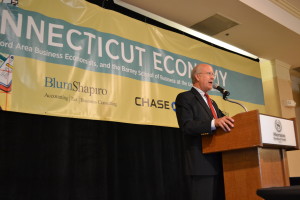Doom and gloom cloud CT
Business leaders see Connecticut as a bad place to do business.
Some 80 percent of them have a somewhat to very negative view of Connecticut as a place to operate, according to a new survey by the Connecticut Business & Industry Association. That”™s up 11 percentage points from last year, leaving the number of people who see the state in a positive light at a new low.
“There”™s a lot of uncertainty over whether Connecticut is a business friendly place,” said Peter M. Gioia, CBIA vice president and economist. “You wonder how optimistic and good it could be if businesses thought it was super friendly here ”¦ It”™s something we could certainly improve.”

and a Bridgeport resident, addresses conference.
At the annual CBIA Connecticut Economy conference in Rocky Hill, business leaders from around the state gathered Sept. 6 to review the year and discuss the state”™s economy. There, in a partnership with BlumShapiro, an accounting, tax and business consulting firm, CBIA released its 2013 Survey of Connecticut Businesses, showing a bleaker outlook. Only about one in 10 respondents have a very or somewhat positive opinion of the state.
At a time when states like North Carolina, South Carolina, Florida, Virginia and Texas are actively recruiting Connecticut companies to move, speakers at the conference stressed the state will need to do more to stay competitive.
Gioia admitted Gov. Dannel P. Malloy and Department of Economic and Community Development officials have made positive steps and seem to be listening to businesses concerns over energy costs and hiring. But he said more could be done stabilize government finances and to promote pro-businesses rhetoric.
About 65 percent of survey respondents say they are somewhat to very pessimistic that the state will have a vibrant, growing economy in the next five years. Many say the state needs to control spending and balance the budget without additional taxes.
“I think we”™re on the cusp of businesses being able to grow,” Gioia said, while announcing results of the 2013 Survey of Connecticut Businesses at the conference. “But where they grow is the question.”
Roughly 377 businesses responded to the survey, now in its 12th year. Those responding constituted a 35 percent decrease from last year.
According to respondents, Connecticut”™s quality of life remains one of its greatest assets, followed by its proximity to customers and major markets in New York and Boston. However this year, far fewer respondents said the state”™s skilled workforce was also an asset. Whereas more than half of respondents usually identify skilled workers as a key asset, only 32 percent of respondents did so this year.
In a closer look, Thomas Devitto, a BlumShapiro chief marketing officer, said many respondents felt the state”™s workforce skills were no better or worse than others, that there was a shortage of skills specific to their business needs and that skills overall had declined.
“This is a shame,” Devitto said. “This is the first time it”™s fell below 50 percent ”¦ they don”™t see a difference between our state and others.”